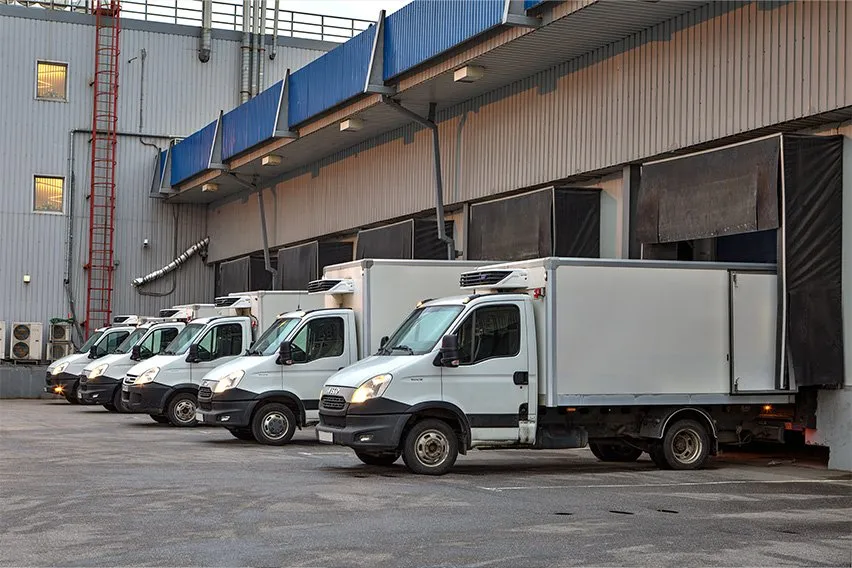How to Start a Successful Trucking Company

The trucking and freight transportation industries make up a significant portion of the American economy. As perishable, nonperishable and construction-related goods make their way across interstates and highways, experienced drivers and established trucking businesses keep the industries that depend on them going. In this guide, we’ll explain how to start a trucking company with practical pointers and steps to follow.
Whether it takes decades or merely months to decide that you want to begin your business journey in the trucking industry, having the right tools and information can set you up for future success. In this guide, discover what a trucking business does and how to begin.
What Does a Trucking Business Do?
There are many business models within the trucking industry. These range from one-man shows with a single semi truck, to full company fleets complete with thousands of rigs and drivers. Regardless of the size or structure, trucking is a service provider that delivers transportation for up to 70% of the products that we use, consume, eat or need to get on a regular basis.
Different trucking companies may specialize in the types of goods or products they haul from one location to another. Additionally, companies might work with specific distribution or operations centers to pick up new goods by truck. Some companies even operate within key regions of the country in order to provide fast and efficient truck delivery.

Forecasts and Trends for Trucking Companies
As a whole, the trucking industry is not exempt from the typical challenges that affect industries such as manufacturing, retail, construction and others. The need for transported consumer goods, products and materials often depends on larger cultural and economic trends. While that’s the case, organizations like the American Trucking Organization regularly release relevant statistics on trends in trucking that could affect business decisions.
For instance:
- In 2018, revenues increased nationally from the year prior
- 11.5 billion tons of freight were transported by trucking companies in 2018
- At least 1,300 new trucking jobs were created in 2019 as a result of shortages or other transport needs
8 Steps to Launching Your Trucking Business
The trucking industry plays a significant role in the everyday usage of goods and products across America. If you’re looking to start a trucking business, the potential rewards and opportunity for expansion are great.
By following the steps below, you’ll be better equipped to launch your company with the appropriate framework from day one.
1. Research and Plan with Purpose
If you’re interested in learning how to start a trucking business, chances are you good that you have some experience in the industry already. Whether that means working in an administrative or distribution role, or if you’ve been a trucking company driver, you can use this knowledge to set a foundation for your business.
Your company’s profitability begins long before you get a truck, sign clients or start delivering goods. In fact, the more you research you do about things like regulations, assets, costs and industry standards, the better you can serve your customers in the long run.
Here are a few major ideas you should plan out (on paper) before starting your trucking company:
- An anticipated timeline and launch date
- State and federal requirements you have met or will need to meet
- Any assets you acquire and what you may have access to
- Information about local and regional competitors
- Expected goals for business growth and sustainability
2. Decide on a Business Plan and Structure
Once you have some of the basic brainstorming out of the way, it’s time to move on to the business plan aspect of your trucking business.
A business plan includes:
- Realistic goals for company growth
- General idea of income and expenses
- Plans for hiring and employment
- List of assets and financial information
- Unique value proposition within the industry
Formalizing a business plan gives you better leverage when working with banks, potential investors, new clients and even future employees.
3. Secure Certifications and Licenses
The trucking industry offers plenty of potential for new entrepreneurs, but it’s also a highly regulated field. As most experienced drivers know, maintaining the appropriate licenses and legal certifications helps you maintain compliance.
Below are some of the top certifications that you will need to start operating your business:
- Commercial driver’s license (CDL): A CDL is required at the federal level for all commercial truck drivers. Since this is a common need, there are many ways to secure this requirement through local classes and other resources. Even if you, as a trucking company owner, aren’t driving a truck, it’s important that your CDL stays up-to-date.
- Operating authority and motor carrier (MC) number: Operating authority comes from the Department of Transportation (DOT) and is required for all for-hire carriers moving materials across state lines by truck. You can secure your own motor carrier number directly from the DOT.
4. Satisfy Compliance and Legal Requirements
In addition to the above certifications, there are several standards your company must adhere to from a legal perspective. Not only do these change your ability to operate if you’re in violation, but they also dictate how you pay taxes on the company.
As you start your company, following these steps should be one of your top priorities:
- USDOT number: A USDOT number applies to certain types of drivers and freight carriers, particularly those that carry hazardous materials by truck. If you engage in any type of interstate commerce, check out whether you need to get this number.
- Process agent: In the event of legal charges or federal proceedings, having a process agent on hand is a federal requirement. While the specific guidelines vary by state, the process agent is responsible for receiving and fielding paperwork in the event of litigation.
- Heavy use and fuel tax agreements: If your truck weighs over 55,000 pounds on the road, you may be subject to the heavy vehicle use tax. Additionally, trucking companies are mandated to report the amounts of fuel used in transport.
While it may create more administrative responsibilities up front, adhering to the requirements of the law can help you avoid unnecessary legal costs or headaches.
5. Obtain the Necessary Funding and Finances
A commercial trucking company requires significant startup expenses, and this is something that you should consider when creating your business plan. If you don’t have the funds in a personal account, you may need to get investors or pursue business loan options.
Additionally, it’s a good idea to be proactive about your accounting needs when business begins. A stress-free invoicing system can help with billing clients on time to get the funds you’re due. Using a streamlined accounting system built for business owners and truckers can also make your financial life much easier as you manage accounts, expenses and more.
6. Purchase Equipment and Suitable Vehicles
Because you’ll need to make several major purchases, including tractors, trucks, maintenance equipment and business licenses, it’s a smart idea to consider a new line of credit. This allows you to meet the needs of your new business while protecting cash assets.
Remember, in a highly regulated industry like trucking you can’t afford to cut corners on poor equipment or materials. Safety, customer trust and business growth depend on having reliable vehicles. Make smart truck purchases, but maintain compliance along the way.
7. Secure Complete Insurance Coverage
In trucking, insurance is one of the most important aspects of your everyday business. Not only do you need to insure the vehicles and rigs you purchase, but you also need to get liability insurance for any potential damages incurred while operating a truck.
The types of insurance to look into include:
- Limited liability insurance
- Cargo insurance
- Passenger accident insurance
The Federal Motor Carrier Safety Administration is an excellent resource for learning more about specific filing requirements and policy needs for owners and truckers.

8. Hire a Team
One of the final steps on your business-building journey is to hire a team to serve your growing client base.
A full-fledged trucking company team may include:
- An executive or leadership team
- A fleet or team of truck drivers
- Administrative and office personnel
- Liaisons to distribution facilities
- Freight and cargo specialists
- Marketing, sales and other business personnel
To spread the word about your new business venture, you should start connecting with future clients and networking in professional circles.
Additionally, hiring a few dedicated team members for sales and marketing may be critical in getting your business off the ground. The success of your company will take a full-fledged effort by several people with different backgrounds, skill sets and levels of industry experience.
Also Read: How to Start Transport Business
Start Your Trucking Business Journey Today
It’s our hope that this guide on how to start a trucking company has equipped you with a basic understanding of moving forward with your business goals. For even more specific information on starting a trucking service in your own region, consult a personal business advisor or get in touch with a financial expert.
As you begin your new business venture, allow the existing competition and present challenges to inspire and propel you toward success. Although you might encounter a few initial roadblocks along the way, learning to overcome these things will solidify your grit, determination and mindset. As your trucking company grows, you may even find yourself mentoring others who have the same hopes to get started!
RELATED ARTICLES

 How to Start a Consulting Business
How to Start a Consulting Business How to Start a Farm: Grow Your Farming Business from the Ground Up
How to Start a Farm: Grow Your Farming Business from the Ground Up How to Start a Business: From Registering to Launching a Startup
How to Start a Business: From Registering to Launching a Startup Essential Skills Every Entrepreneur Should Have
Essential Skills Every Entrepreneur Should Have How to Start a Business for Social Good
How to Start a Business for Social Good 20 Online Business Ideas: Which Internet Business Is in Most Demand?
20 Online Business Ideas: Which Internet Business Is in Most Demand?